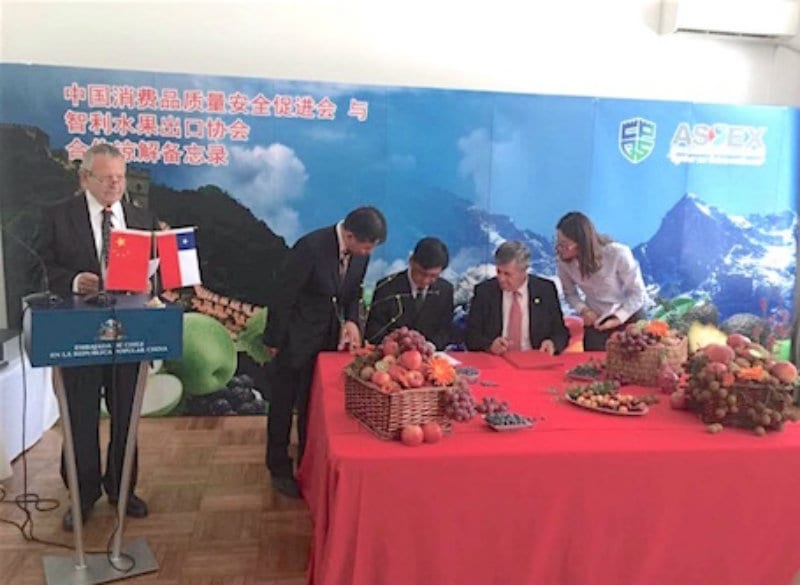
BEIJING – As part of its participation in President Michelle Bachelet’s Tour to Indonesia and China, the President of the Association of Fruit Exporters of Chile AG (ASOEX), Ronald Bown, signed in Beijing an important Memorandum of Understanding (MOU) in Cooperation with the Association for the Promotion of the Quality and Safety of China’s Consumer Products (CPQS), a body dependent on the AQSIQ, China’s phytosanitary agency.
The signing ceremony was held over the weekend at the offices of the Chilean Embassy in China, and was attended by Sun Dawe, the Vice Minister of AQSIQ, Chile’s Minister of Agriculture, Carlos Furche, the Chilean Ambassador to China, Jorge Heine, and the Agricultural Aggregate, Carlos Parra.
The Director General of the CPQS, Zhang Qinrong, the Deputy Director General of the CPQS, Mr. Wang Tiefu, other representatives of the AQSIQ and the CPQS, the media, and executives of importing, distributing and exporting companies in China also attended the ceremony.
“This Agreement will strengthen and further deepen the friendship and cooperation ties between the Chilean and the People’s Republic of China’s fruit sectors. This will be achieved through the exchange of experiences in areas associated with the production, export, promotion, quality and safety of the products, and by intensifying the commercial contacts between the entrepreneurs of both countries,” Bown said.
He added that under the agreement, a mission led by CIQ Director of Shenzhen Port Wang Jun and representatives of Chinese exporting and importing companies: Pagoda, Gansu Ganffer Fruit Co, Quingdao Texbond Co., and Beijing FuFeng You Yuan Trade Co. visited Chile in March and met with ASOEX. “This mission’s objective was to get to know our industry, the work done by the Agricultural and Livestock Service in the inspection, the phytosanitary certifications of the exported fruit, and contacting Chilean producers and exporters,” he said.
Both organizations agreed to exchange information on the quality and safety management system, as well as on quarantine and inspection standards, among other issues related to fruit products of interest to one or both parties.
Both parties also agreed to meet at least once a year to be better coordinated.
In addition, ASOEX and the CPQS agreed to jointly organize workshops, conferences, and other events, and to collaborate with each other in promotional activities.
Fruit exports
During the 2015-2016 season, Chile exported more than 2.5 million tons of fresh fruits, 500,143 tons of which were sent to the Asian market, mainly to China, which received almost 250 thousand tons, i.e. 81% more than in the previous season.
“Chile is currently the main supplier of fruit to China, with exports of USD 1.2 billion. We have to highlight the presence of our cherries in the Chinese market. This product is highly valued by consumers, and this motivated us to invest about USD 5 million in promotional activities in more than 36 cities during the last season. The goal was to increase local consumption of this fruit,” Bown said.
He added: “China has authorized the entry of eight of our fruits: apples, grapes, kiwis, plums, blueberries, cherries, avocados, and most recently nectarines. We have already started negotiations to materialize the entry of our pears into the Chinese market. All these achievements have been the product of a coordinated and professional public-private work, and the phytosanitary authorities of both countries, the AQSIQ and SAG.”
During 2015-2016, (September 1, 2015 to August 31, 2016) Chilean fresh fruit exports to China included table grapes (129,112 tons), cherries (39,651 tons), plums (29,159 tons), kiwis ( 24,744 tons), red apples (14,773 tons), avocados (5,273 tons) and blueberries (3,765 tons).
While Bown stressed the importance of China as an increasingly important destination for Chilean fruit, he also stated that “trade must be reciprocal, and that is why we have committed all our support to materialize the entry of Chinese pears to Chile during the current year”.
“We’re carrying out promotional activities in the main supermarket chains, as we implemented some years ago, with the Chinese apples of Shandong Province.”



